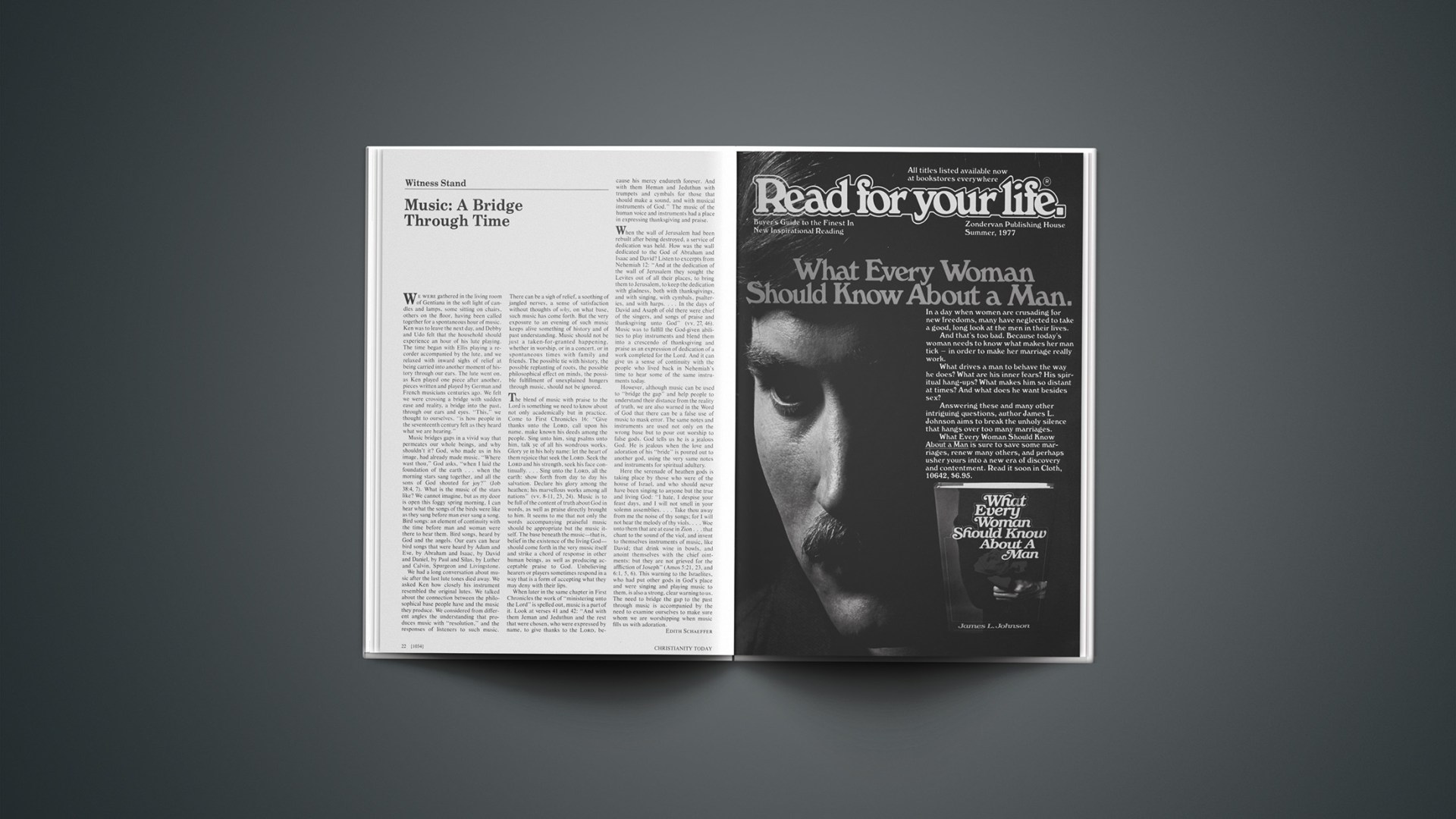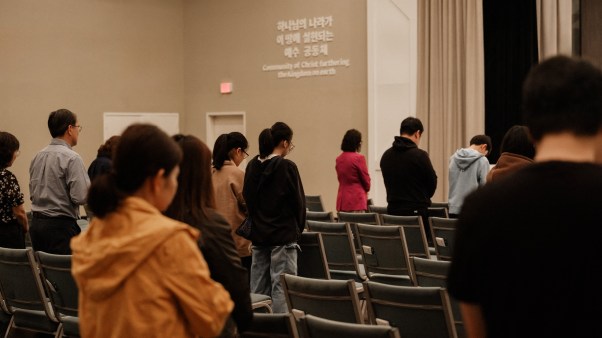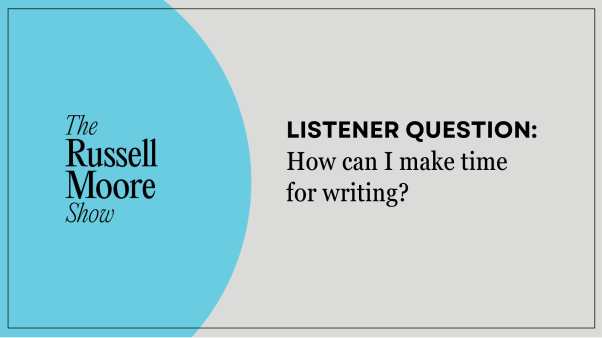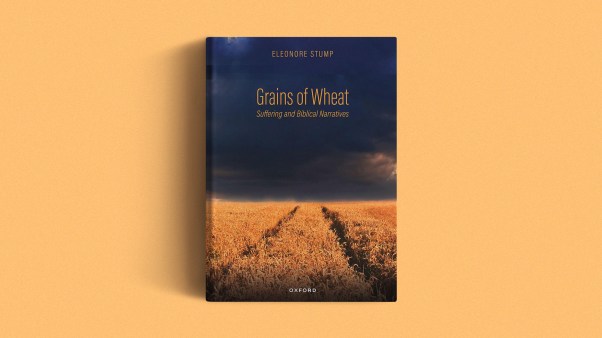We were gathered in the living room of Gentiana in the soft light of candles and lamps, some sitting on chairs, others on the floor, having been called together for a spontaneous hour of music. Ken was to leave the next day, and Debby and Udo felt that the household should experience an hour of his lute playing. The time began with Ellis playing a recorder accompanied by the lute, and we relaxed with inward sighs of relief at being carried into another moment of history through our ears. The lute went on, as Ken played one piece after another, pieces written and played by German and French musicians centuries ago. We felt we were crossing a bridge with sudden ease and reality, a bridge into the past, through our ears and eyes. “This,” we thought to ourselves, “is how people in the seventeenth century felt as they heard what we are hearing.”
Music bridges gaps in a vivid way that permeates our whole beings, and why shouldn’t it? God, who made us in his image, had already made music. “Where wast thou,” God asks, “when I laid the foundation of the earth … when the morning stars sang together, and all the sons of God shouted for joy?” (Job 38:4, 7). What is the music of the stars like? We cannot imagine, but as my door is open this foggy spring morning, I can hear what the songs of the birds were like as they sang before man ever sang a song. Bird songs: an element of continuity with the time before man and woman were there to hear them. Bird songs, heard by God and the angels. Our ears can hear bird songs that were heard by Adam and Eve, by Abraham and Isaac, by David and Daniel, by Paul and Silas, by Luther and Calvin, Spurgeon and Livingstone.
We had a long conversation about music after the last lute tones died away. We asked Ken how closely his instrument resembled the original lutes. We talked about the connection between the philosophical base people have and the music they produce. We considered from different angles the understanding that produces music with “resolution,” and the responses of listeners to such music. There can be a sigh of relief, a soothing of jangled nerves, a sense of satisfaction without thoughts of why, on what base, such music has come forth. But the very exposure to an evening of such music keeps alive something of history and of past understanding. Music should not be just a taken-for-granted happening, whether in worship, or in a concert, or in spontaneous times with family and friends. The possible tie with history, the possible replanting of roots, the possible philosophical effect on minds, the possible fulfillment of unexplained hungers through music, should not be ignored.
The blend of music with praise to the Lord is something we need to know about not only academically but in practice. Come to First Chronicles 16: “Give thanks unto the LORD, call upon his name, make known his deeds among the people. Sing unto him, sing psalms unto him, talk ye of all his wondrous works. Glory ye in his holy name: let the heart of them rejoice that seek the LORD. Seek the LORD and his strength, seek his face continually.… Sing unto the LORD, all the earth: show forth from day to day his salvation. Declare his glory among the heathen; his marvellous works among all nations” (vv. 8–11, 23, 24). Music is to be full of the content of truth about God in words, as well as praise directly brought to him. It seems to me that not only the words accompanying praiseful music should be appropriate but the music itself. The base beneath the music—that is, belief in the existence of the living God-should come forth in the very music itself and strike a chord of response in other human beings, as well as producing acceptable praise to God. Unbelieving hearers or players sometimes respond in a way that is a form of accepting what they may deny with their lips.
When later in the same chapter in First Chronicles the work of “ministering unto the Lord” is spelled out, music is a part of it. Look at verses 41 and 42: “And with them Jeman and Jeduthun and the rest that were chosen, who were expressed by name, to give thanks to the LORD, because his mercy endureth forever. And with them Heman and Jeduthun with trumpets and cymbals for those that should make a sound, and with musical instruments of God.” The music of the human voice and instruments had a place in expressing thanksgiving and praise.
When the wall of Jerusalem had been rebuilt after being destroyed, a service of dedication was held. How was the wall dedicated to the God of Abraham and Isaac and David? Listen to excerpts from Nehemiah 12: “And at the dedication of the wall of Jerusalem they sought the Levites out of all their places, to bring them to Jerusalem, to keep the dedication with gladness, both with thanksgivings, and with singing, with cymbals, psalteries, and with harps.… In the days of David and Asaph of old there were chief of the singers, and songs of praise and thanksgiving unto God” (vv. 27, 46). Music was to fulfill the God-given abilities to play instruments and blend them into a crescendo of thanksgiving and praise as an expression of dedication of a work completed for the Lord. And it can give us a sense of continuity with the people who lived back in Nehemiah’s time to hear some of the same instruments today.
However, although music can be used to “bridge the gap” and help people to understand their distance from the reality of truth, we are also warned in the Word of God that there can be a false use of music to mask error. The same notes and instruments are used not only on the wrong base but to pour out worship to false gods. God tells us he is a jealous God. He is jealous when the love and adoration of his “bride” is poured out to another god, using the very same notes and instruments for spiritual adultery.
Here the serenade of heathen gods is taking place by those who were of the house of Israel, and who should never have been singing to anyone but the true and living God: “I hate, I despise your feast days, and I will not smell in your solemn assemblies.… Take thou away from me the noise of thy songs; for I will not hear the melody of thy viols.… Woe unto them that are at ease in Zion … that chant to the sound of the viol, and invent to themselves instruments of music, like David; that drink wine in bowls, and anoint themselves with the chief ointments: but they are not grieved for the affliction of Joseph” (Amos 5:21, 23, and 6:1, 5, 6). This warning to the Israelites, who had put other gods in God’s place and were singing and playing music to them, is also a strong, clear warning to us. The need to bridge the gap to the past through music is accompanied by the need to examine ourselves to make sure whom we are worshipping when music fills us with adoration.










